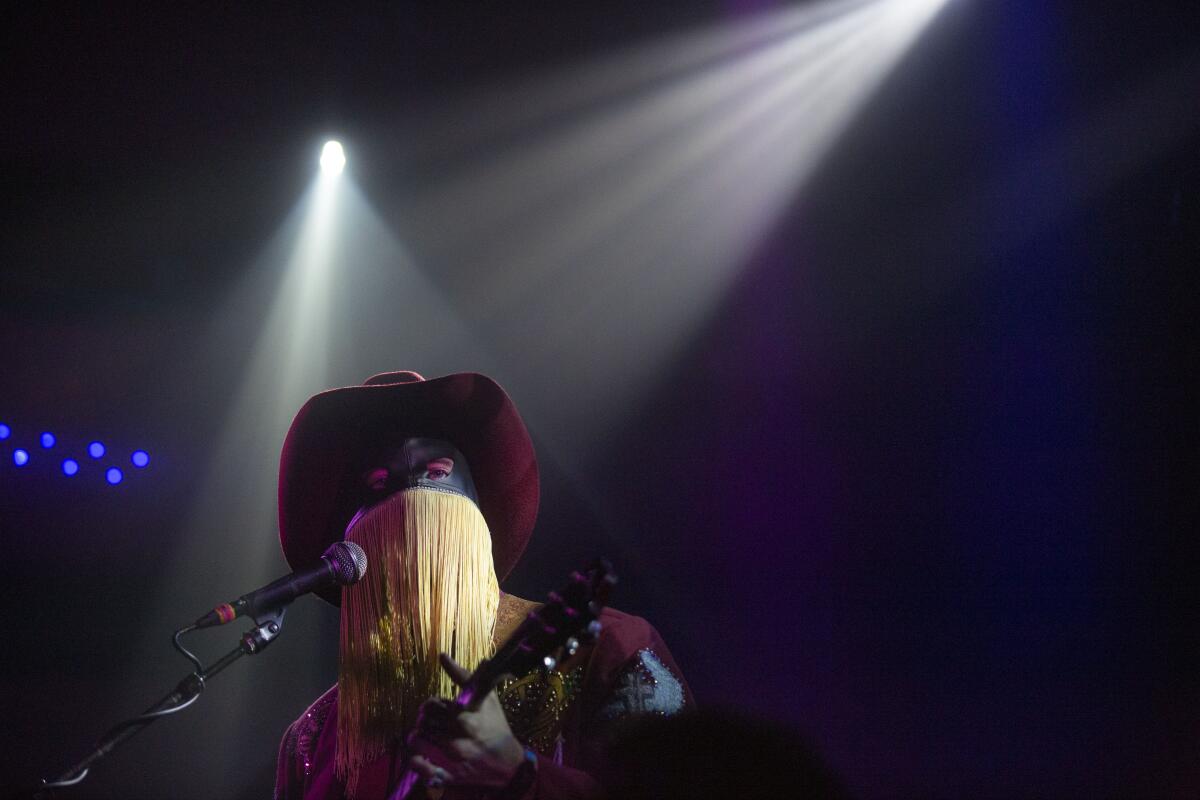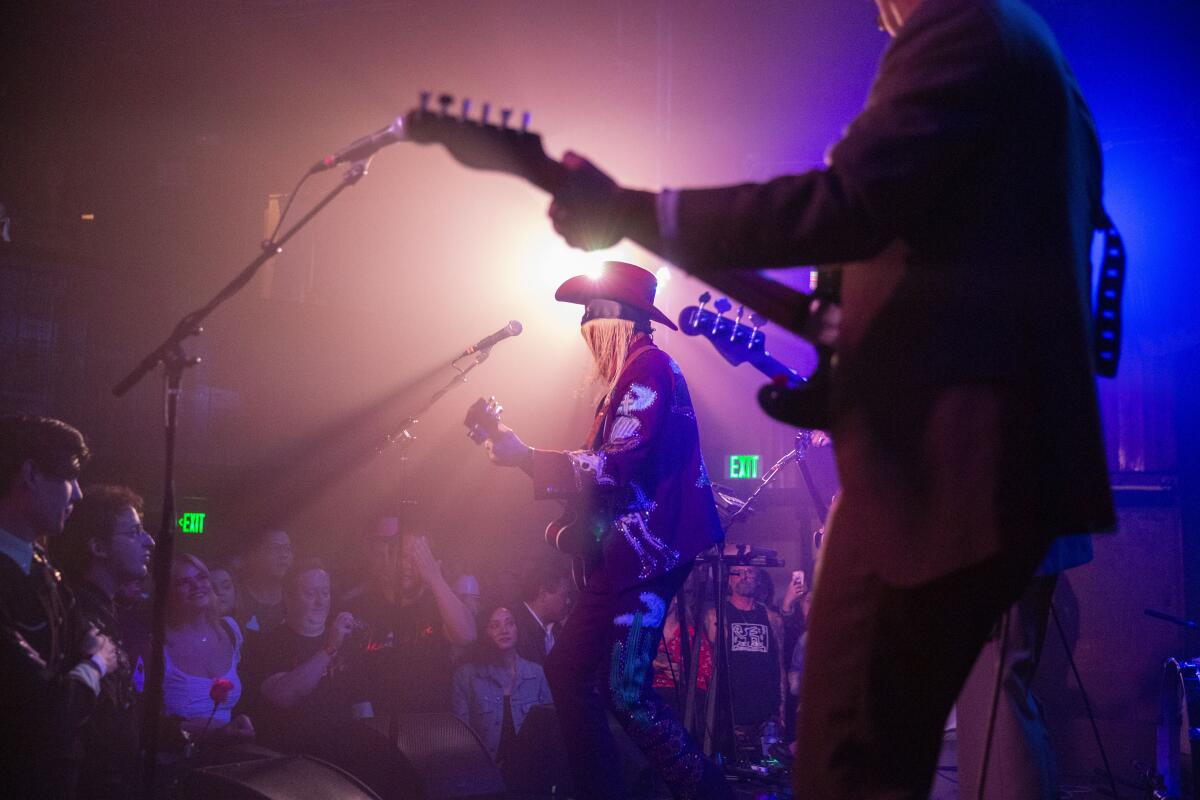
“Hello, I’m Orville Peck.”
Standing onstage recently at the Troubadour, the artist who goes by that stage name greeted his audience in a low, booming drawl meant to summon memories of the late Johnny Cash.
And to some extent the music that followed, with its twangy guitar lines and titles like “Old River” and “Big Sky,” delivered on that invocation. Yet there were obvious differences between Peck and the deep-voiced legend known as the Man in Black.
For starters, Peck, who explicitly describes himself as a country singer, wore a fringed mask that concealed most of his face. He sang about falling in (and out of) love with men. And he was preceded onstage by a pair of charming Los Angeles drag queens, Meatball and Pinche, whose act included the hurling of several McDonald’s cheeseburgers into the crowd.
A versatile and experienced performer with a background in theater and in Canada’s punk scene, Peck, it’s safe to say, is approaching a reflexively conservative genre from a naturally progressive point of view. But though he admits that his motives are in part disruptive, he insists that his feelings for country music — and its densely woven traditions — are as genuine as can be; ditto his eagerness to reach listeners beyond the urban hipsters he played to last month in West Hollywood on tour behind his convincing debut album, “Pony.”
What’s interesting, in a year when “Old Town Road” has reshaped Nashville’s relationship with America, is that he might be in a position to get what he says he wants.
“There’s nothing I love more than the history of music,” Peck said before his show as he sat cross-legged on a sofa in the Troubadour’s tiny dressing room. He wasn’t due onstage for hours but was already wearing his signature mask and cowboy hat, along with denim shorts and a tank top; a thin gold chain looped around his neck, while his fingers glittered with silver rings. “I just find the stories behind all of it so fascinating. That’s what I nerd out about.”
In that case, he must have been psyched to be headlining the Troubadour, given the club’s importance to multiple generations of guitar-strumming Angelenos.
“Are you kidding me?” he replied. Then he added that his booking agent had given him “the option to play here or, uh, I think it was the Teragram Ballroom,” he said, referring to the comparably sized venue near MacArthur Park that opened in 2015. “For me it wasn’t a choice.”
You can hear Peck’s fascination with the past all over “Pony,” which came out in March through the Seattle indie label Sub Pop. In addition to Cash, the carefully arranged music — built around his dramatic vocals that can sweep from a burly growl to a ghostly croon — echoes the doomed romance of Roy Orbison and Chris Isaak in songs like “Dead of Night,” a grandiose ballad about two hustlers stealing through the Nevada desert, and the tender, reverb-drenched “Queen of the Rodeo.” Hints of more rock-oriented stuff, including the Cure and Joy Division, crop up as well, though Peck’s main idea seems to be using country sounds and imagery to embody a perspective not typically represented in such a heteronormative form.
How precisely he came to this mix of influences isn’t clear. Peck, who never appears in character without his mask, is cagey about his age and upbringing; in the interview he’d say only that he was born “in the Southern Hemisphere,” discovered country music as a kid and had been performing since he was “really young.”
Internet sleuths have identified Peck — and consider this a spoiler alert if you’d prefer to preserve the air of mystery he’s after — as Daniel Pitout, the former drummer of a Vancouver punk group called Nü Sensae. Asked to confirm that, his publicist playfully declined. At the Troubadour, though, Peck’s manager called him Daniel — the first half of the name that appears in published reports from London’s West End, where Pitout appeared in 2016 in a musical comedy based on Peter Pan.
Here in 2019, Peck, who looks to be in his late 20s, views the curiosity about his real life with mild irritation. The reason he keeps it vague — with the exception of his sexual orientation, about which he’s direct — is because that way “everyone gets to decide a little bit what I mean to them.” And besides, he added, whatever insight might be gained from his biographical details is nothing compared to the emotional truth right there in his music — in a stop-you-in-your-tracks lyric, for instance, like the one in “Big Sky” that goes, “Heartbreak is a warm sensation when the only feeling that you know is fear.” (Lending credence to Peck’s claim, Sub Pop co-president Tony Kiewel said he signed the singer before he knew anything about his Lone Ranger-style presentation.)

“This is by far the most open I’ve ever been as a writer,” Peck said. Even so, his heightened appearance onstage and in his music videos has led some to question the sincerity of his act. Peck scoffs at the suspicion. “Country music sits at the crossroads of sincerity and theatricality,” he said — a great line he’s no doubt had ample opportunity to hone. “What I do is no different than Dolly Parton wearing a crazy wig or Johnny Cash wearing a black suit, saying he’s an outlaw.”
The hipsters in West Hollywood, where Parton is as venerated as any pop diva, certainly seemed to agree. But what of country fans in the heartland? Next week Peck is set to perform at the Americana Music Assn.’s annual festival in Nashville alongside such stalwart roots-music types as Tanya Tucker and Delbert McClinton.
Of course, those veterans themselves can find little traction these days on mainstream country radio — a situation that led Jed Hilly, who heads up the AMA, to say, “I don’t see Orville writing songs with the intention of penetrating the commercial marketplace. I think his first intention is to try to tell stories in the most creative way that he can.”
Yet Peck views the crossover success of Lil Nas X — a gay black teenager who connected with a historically broad audience almost entirely without the help of the Nashville power structure — as proof that country listeners are more receptive to change than many insiders likely presume.
“It’s just the gatekeepers that are scared,” Peck said as he prepared to head onstage for a sound check. “I think country music is going through a growing pain where it’s including voices and inspirations from other cultural backgrounds. They’ve always been there; they’ve just never been able to be showcased.
“Now people are not taking no for an answer.”